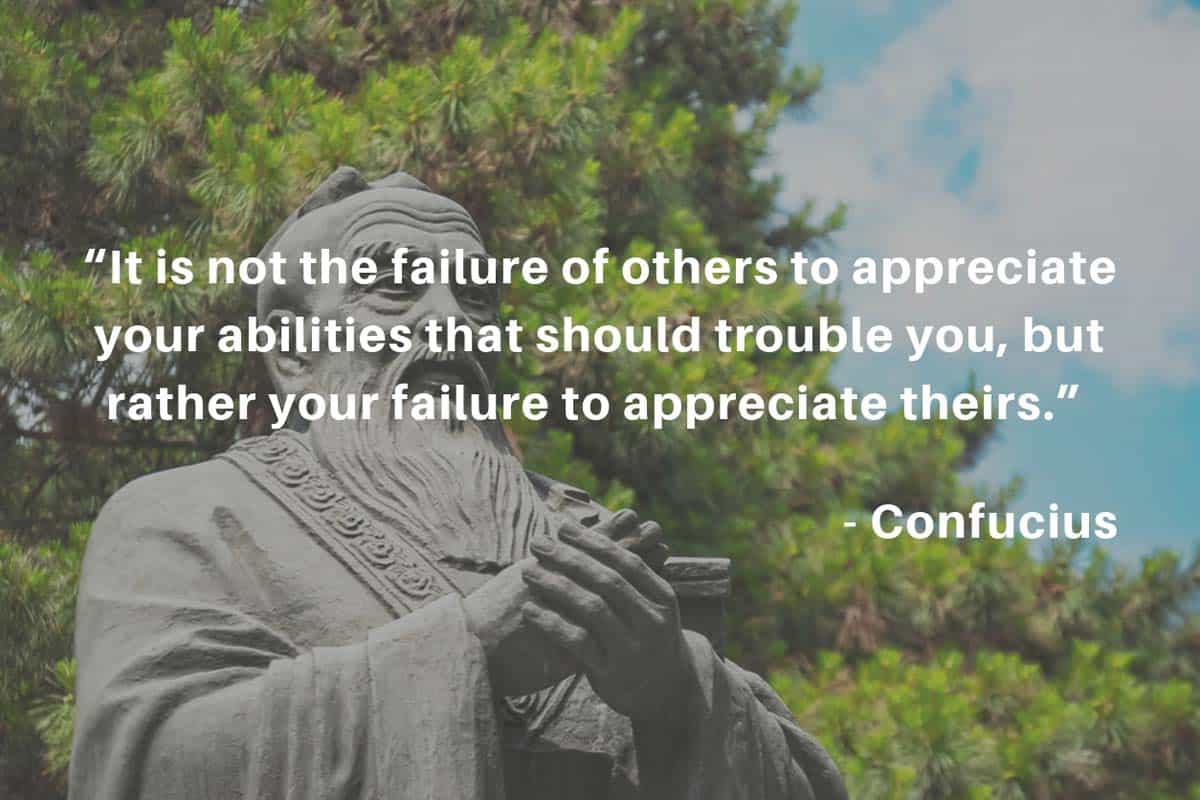Ask any business owner, CEO, or manager how often they receive offers for leadership training and they are likely to answer “every single day.”
Teaching business people how to be leaders is a massive industry. There are online courses. One-day or even week-long seminars. Podcasts. Books. TED Talks. You name it, you can probably find it. Leadership groups exist in cities all across the country, and many businesses are, rightfully, focused on grooming effective leaders in order to ensure low turnover, strong corporate morale, and, of course, a high profit margin.
But the “secrets” of great leadership aren’t really a secret at all. In fact, almost everything you need to know about how to lead an organization can be traced back to the simple yet powerful lessons of a philosopher whose impact was first felt in the 6th century BC.
That’s right! Our best teacher on the matter of leadership is, well, Confucius.
His cultural revolution in ancient times, the virtue of his disciples, his teachings, the way he thought at that time, and the way moved heaven and earth to run government, led to Confucian values, filial piety, and, ultimately, true leadership we still use today.
This is not to say that there aren’t scores of valuable lessons in the aforementioned books, seminars, podcasts, and online courses, either to new leaders or those who have been at the top of the corporate ladder for decades. Furthermore, we’ll recommend some great leadership books at the end of this article. But the fundamental lessons in almost all of these training opportunities can always be tied back to one of the most important minds in all of human history. Take a look at how some of these quotes from Confucius define what it means to be a leader.
5 Lessons From Confucius on Leadership
1. Leaders Ask Questions When They Are Unsure
“The man who asks a question is a fool for a minute, the man who does not ask is a fool for life.”
Like with Confucian servant leadership, the best leaders know what they don’t know. In other words, they are not afraid to ask questions and ask them often, even if it means overcoming the fear of revealing one’s own ignorance. Grandstanding, know-it-all managers are sure to lose employees’ trust and respect, prompting them to keep a constantly updated resume in circulation, in search of a better workplace with a higher standard of management. Revealing your own ignorance can be a strength for leaders, rather than a weakness. Asking those around you with different skill sets to weigh in on unfamiliar territory could not only help you earn their trust as a leader, but it may educate you in the process.
2. Appreciate Your Team’s Abilities
“It is not the failure of others to appreciate your abilities that should trouble you, but rather your failure to appreciate theirs.”
A powerful lesson for many first-time managers is the need to shift their focus from “what does the team think of me?” to “what do I think of them?” A manager or CEO consumed by the need to be “liked” is doing it all wrong. Rather, a true leader turns his attention to his team and works to understand (and maximize) their talents and improve their weaknesses. This is not to say it’s unimportant to be liked in the sense of being a collegial, considerate, and thoughtful leader. However, the best leaders will shift their thinking to more focus on what they respect, admire, and like about their team members.
3. Making The ‘Right’ Decision Can Be Difficult
“To see what is right and not do it is the worst cowardice.”
Swift and mindful decision making is crucial when it comes to succeeding as a business leader, and this is an area where so many fall short. And the fallout from poor decision making (or a complete lack of it) wreaks havoc on a business. This kind of corporate culture, one where there appears to be no consistency in decision making, will result in low morale, suffering productivity, and inevitable turnover.
True leaders must strive to make the right decisions even when they are unpopular or uncomfortable. When the CEO’s niece is appointed a manager yet fails to lead her group, consistently misses targets, and alienates colleagues, that CEO must make the decision to remove her from that role (and possibly the company entirely). It might make the annual family picnic a bit uncomfortable, but it’s the right decision for the day-in and day-out morale of all the other employees.
4. Don’t Focus Solely On Profits
“The Master said, ‘If your conduct is determined solely by considerations of profit you will arouse great resentment.’”
Leaders are focused on the bottom line and rightfully so. But the wisest leaders understand how to inspire a workforce without making everything appear to be bottom-line driven. Focusing on a healthy corporate culture, especially as it pertains to work-life balance, can result in a better bottom line. Engaged and happy workers will perform better in their roles, and there are so many simple (and cost-effective) ways to create this kind of culture. Whether it’s a generous paid time off program or simply taking an interest in and celebrating their achievements outside of work, leaders have opportunities every day to remind employees they are more than just numbers.
5. Don’t Be Afraid To Surround Yourself With Smart, Ambitious People
“If you are the smartest person in the room, then you are in the wrong room.”
A weak leader is afraid to hire a subordinate who appears to be smarter or more accomplished than they are; a strong leader knows she should constantly surround herself by people who inspire and challenge them to do better. Mediocre hires will produce mediocre results. The best leaders seek the best talent—even when that means putting their own egos aside.
Conclusion: Take Action
“A superior man is modest in his speech, but exceeds in his actions.”
The proof is in the pudding when it comes to strong leadership and, in this case, that pudding is action. A powerful orator is only effective as a leader when his actions match the content of his speeches. The best CEOs and managers follow up on their words by showing employees they are genuine. This can mean “getting in the trenches” to help a team meet an important deadline, following through on a commitment to pay incentives, keeping an open-door office policy to invite questions and concerns, or, in some cases, even foregoing their own salary during a difficult financial time for the business.
Recommended Books on Leadership
If you are looking for other great lessons on inspired leadership, these best-selling books are among the most tried and true reads:
- Collins, Jim. Good to Great: Why Some Companies Make the Leap and Others Don’t. HarperBusiness, 2001.
- Goleman, Daniel. Emotional Intelligence: Why it Can Matter More than IQ. Bantam, 1995.
- Lencioni, Patrick. The Five Dysfunctions of a Team: A Leadership Fable. Jossey-Bass, 2002.



50 funny quotes you share are quite interesting. I would love to read your article. Hope you will have more good posts in the future.